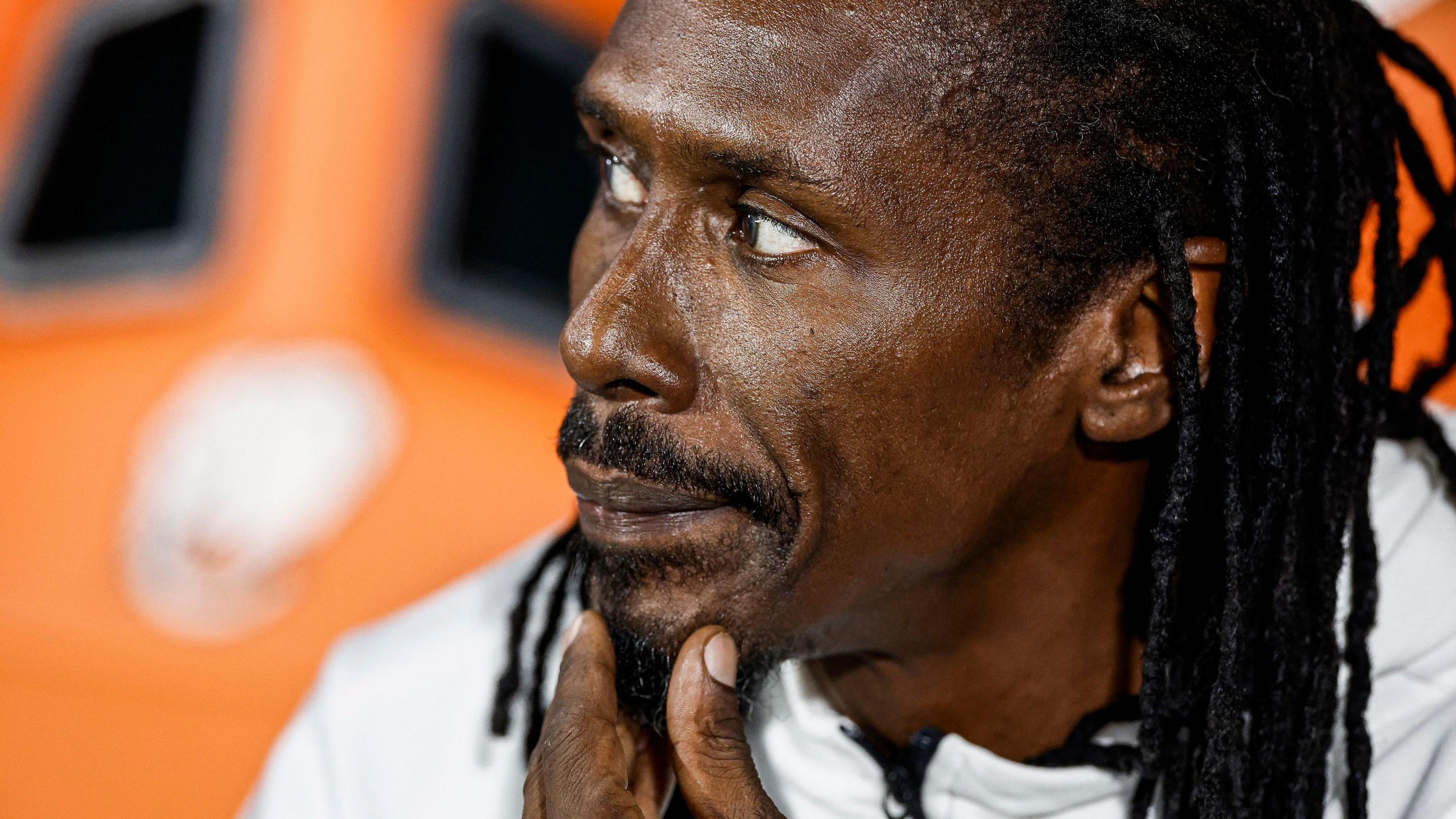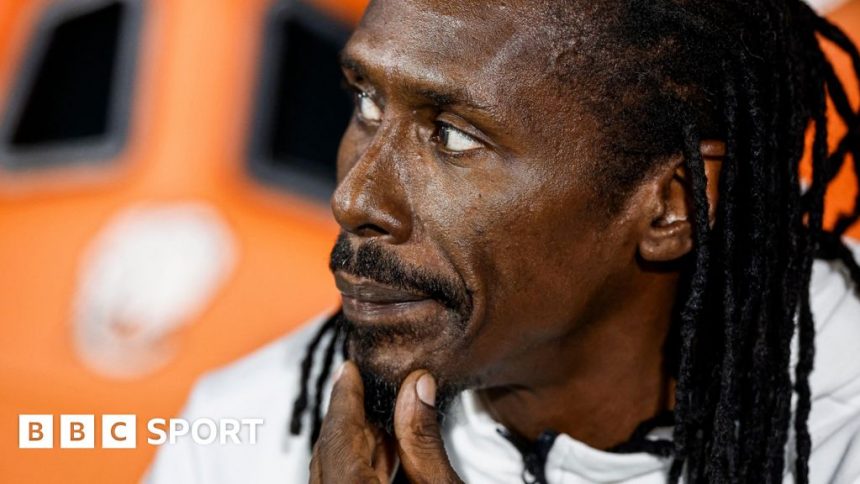Cisse exit ‘very sad’ for Senegal football president

Aliou Cisse spent nine and a half years in charge of Senegal
-
Published
The president of Senegal’s football federation (FSF) was “very sad” to see Africa Cup of Nations-winning coach Aliou Cisse leave his role last month following a directive from the country’s sports ministry.
Cisse, who led the West Africans to a first ever Nations Cup (Afcon) title in February 2022, was let go after nearly a decade in charge – with the FSF and sports ministry, which pays the national coach’s salary, at odds over the decision.
During his tenure, Senegal were also runners-up at the 2019 Afcon and reached two Fifa World Cups, and the 48-year-old had not lost a competitive match, other than on penalties, since the start of last year.
“Before he arrived we had never won a continental trophy,” FSF chief Augustin Senghor told BBC Sport Africa.
“This was enormous for us. For this reason I think it was good to let him finish his job, because Senegal is in a phase of transition.
“He went because of a decision by government. We respect it because we respect the authority.”
Although Cisse’s contract had expired in August, he stayed on for September’s opening 2025 Afcon qualifiers, picking up four points from two games, and was expecting to receive a 12-month extension to his deal.
“He was surprised, but the message he gave was that he did not want to create a difficult crisis,” Senghor explained.
“He’s very committed to his country. He said: ‘President, I will support Senegalese football, because I am a son of this country’.”
-
-
Published8 February 2022
-
-
-
Published2 December 2022
-
Overseeing change
Senghor had wanted Cisse to finish the shortest Afcon qualifying campaign in a decade, with all six fixtures completed in the space of three months.
“The generation of Sadio Mane, Idrissa Gana Gueye, Kalidou Koulibaly and others have maybe one or two years to play, and perhaps one more World Cup,” Senghor said.
“After that, we have the new generation – Lamine Camara, Pape Matar Sarr, Habib Diarra and all the players who were in our youth teams.
“We’ve been working on it for a long time and Aliou was one of the key men in this plan.
“We think it would have been better if he stayed for one more year to finalise the transition and leave with honour.”
However, Senghor believes Cisse is young enough to return to the job in future.
Avoiding conflict
Senegal’s triumph at the 2021 Afcon prompted scenes of jubilation on the squad’s return to Dakar
Cisse’s lengthy tenure – a rarity on the continent – coincided with Senegal’s most sustained period of success as they spent four years as Africa’s top-ranked side.
Prior to his appointment in March 2015, the national team had reached one Afcon final and one World Cup – with both of those appearances coming in 2002 when Cisse captained the side.
Their improved fortunes kick-started a run that saw the Teranga Lions conquer the continent at Under-20 and Under-17 level, as well as in the African Nations Championship (CHAN).
The axe came quickly when it fell, with Cisse dismissed just two days before a planned squad announcement.
An FSF statement said he had failed to reach his objectives, namely: winning this year’s Afcon and reaching the quarter-finals of the 2022 World Cup (where they lost to England in the last 16), slipping down the world rankings (Senegal are 20th, three places below their record high) and, crucially, “the risk of disaffection between our national team and the Senegalese in general”.
Criticism of Cisse’s tactics had increased after their 2023 Afcon exit – sparking the ministry’s move in what many saw as a populist act.
“The agenda of the government is not the same as the agenda of football,” Senghor said.
“They decided and, unfortunately, we could not oppose it. If we want to continue, we need to do so in a framework of stability.”
Senghor added that conflict between the FSF and the government is “not fruitful”.
New Senegal boss expected before March
Pape Thiaw was placed in charge for Senegal’s final four Afcon 2025 qualifiers
Pape Thiaw, previously Cisse’s assistant and also the coach who led Senegal to their CHAN triumph last year, has completed the Afcon 2025 qualifying campaign.
“We said ‘We’ll do Aliou without Aliou – he’s not here, but he’s here. Every time you are on the bench, think that Aliou is with you’,” explained Senghor.
Two victories over Malawi secured qualification from Group L with two games to spare.
There are four months until the next international break in March, when Senegal will resume their bid to reach the 2026 World Cup.
“We have three or four months to go slowly, smartly and make the right choice,” said Senghor, who expects to appoint a new coach before those games.
Targeting World Cup progress
It is probable the FSF will look internally, continuing a vision that Senghor has instilled since taking charge in 2009.
“Nowadays, all our coaches are from our country and we don’t have any reason to change,” he said.
“When you want to build something in your nation, you have to first begin by building the coaches and their skills.
“It is working. Now is not the moment to change the philosophy.”
Whoever gets the job will have to accept some lofty targets.
They hope to not only surpass their historic World Cup quarter-final appearance in 2002 but also Morocco’s run at Qatar 2022, when the Atlas Lions became the first African side to reach the semi-finals.
“Qualifying for the Nations Cup is not an event for us now,” ventured Senghor.
“Now our target is to go to the World Cup every four years and to improve in the World Cup, maybe go further than Morocco – to the final.
“Why not? We have the potential.”





